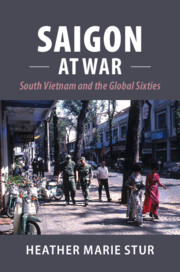Book contents
- Saigon at War
- Cambridge Studies in US Foreign Relations
- Saigon at War
- Copyright page
- Dedication
- Contents
- Figures
- Acknowledgments
- Introduction
- 1 The Heart of South Vietnam
- 2 A Tradition of Activism
- 3 South Vietnam’s Sixties Youth
- 4 South Vietnam and the World
- 5 Building Connections between the People and the Government
- 6 Saigon after Tet
- 7 The Catholic Opposition and Political Repression
- 8 Saigon in the Seventies
- Conclusion
- Select Bibliography
- Index
8 - Saigon in the Seventies
Published online by Cambridge University Press: 15 May 2020
- Saigon at War
- Cambridge Studies in US Foreign Relations
- Saigon at War
- Copyright page
- Dedication
- Contents
- Figures
- Acknowledgments
- Introduction
- 1 The Heart of South Vietnam
- 2 A Tradition of Activism
- 3 South Vietnam’s Sixties Youth
- 4 South Vietnam and the World
- 5 Building Connections between the People and the Government
- 6 Saigon after Tet
- 7 The Catholic Opposition and Political Repression
- 8 Saigon in the Seventies
- Conclusion
- Select Bibliography
- Index
Summary
In the final weeks of 1974, Catholics and journalists in Saigon caused President Thieu to call in his riot police again. The alliance of church and press stemmed from a common desire to expose alleged corruption of Thieu and his family. Several Saigon newspapers had published Father Tran Huu Thanh’s accusations of corruption against the president, including suppression of the press and rules making it difficult to form political parties so as to enshrine a one-party system and prevent the opposition from wresting control from Thieu. Thieu had the publishers of those papers arrested and placed on trial. Anti-government activists had planned a massive demonstration to take place on the first day of the trial, and when word of the protest reach Thieu, he warned citizens that 20,000 officers were preparing to put a damper on the march. When police and anti-Thieu protesters had clashed back in October, Fr. Thanh and some other Catholics gathered at Tan Sa Chau Church on the edge of Saigon and composed a statement in which they demanded that the president “return power to the people so that they can refashion the life of the country and reconstruct the independence of the nation.” The two groups in trouble, Fr. Thanh’s People’s Anti-Corruption Movement and the Committee of Struggle for Freedom of the Press and Publications, did not want to tear down the Saigon government. They simply wanted Thieu gone. Fr. Thanh took abuse from all sides. Members of the Provisional Revolutionary Government called him an “American stooge.” Thieu accused him of having the support of both communists and colonialists.1 In the midst of the chaos and suspicion that marked Saigon in the seventies, it was difficult for Fr. Thanh to prove that he was an anti-government, anticommunist, anti-colonial nationalist.
- Type
- Chapter
- Information
- Saigon at WarSouth Vietnam and the Global Sixties, pp. 223 - 259Publisher: Cambridge University PressPrint publication year: 2020

